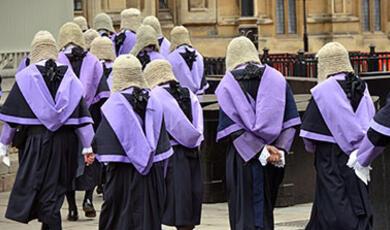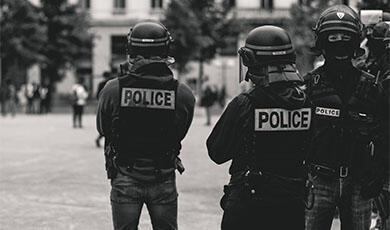Press release: Do We Need the Police?

Policing has often served the function of protecting the ruling class against threats to its power, such as left-wing political dissent
Policing in the UK also “institutionally racist”
However, abolition “probably not a realistic goal”
Embargo: Thursday 25 May 2023 6pm (UK time)
I would like to invite you to a lecture on Do We Need the Police? by Professor Leslie Thomas KC on Thursday 25 May 6pm (UK time) at Gresham College or Online. This is the third anniversary of the death of George Floyd. Professor Thomas will discuss the role of the police throughout British and American history and consider if the police force can be reformed or should be abolished.
Professor Leslie Thomas KC embarks on a fascinating journey into the early 19th century criminal justice system. Experience the chilling reality of the "Bloody Code," where numerous offences were punishable by death, with public hangings serving as a grim spectacle. This system primarily aimed to safeguard the wealth and privileges of the elite amidst the rise of industrial capitalism. Professor Thomas will shed light on the complexities of an era where crime detection and punishment were rudimentary, forcing the state to rely on the deterrent effect of public executions for societal control. He uncovers a world less efficient, yet more brutal, than our present-day criminal justice system.
In the lecture, Professor Thomas recounts the ground breaking establishment of the Metropolitan Police by Sir Robert Peel in 1829. Peel's visionary initiative brought forth London's first centralised professional police force, setting a precedent that swiftly extended throughout the newly industrialised British nation. “Brutality of punishment has been replaced with certainty of punishment”. While police in Great Britain were traditionally unarmed “the UK exported a paramilitary model of policing to its colonial territories.”
The lecture will look at the disquieting truth behind the public facade of the police in the UK and the deeply rooted issue of institutional racism. Independent reports, such as the visionary Macpherson Inquiry in the 1990s and the recent findings by Baroness Casey, have shed light on the stark disparities within the criminal justice system. Shocking statistics reveal that Black individuals in the UK are over three times more likely to face arrest compared to their white counterparts. The disproportionate rates of stop and search further expose the realities of racial profiling, with 7.5 instances for every 1,000 white individuals, surging to a staggering 52.6 for every 1,000 Black individuals. Baroness Casey's comprehensive review has unveiled profound cultural challenges within the Metropolitan Police, emphasising its failure to represent Black, Asian, and minority ethnic communities adequately. Furthermore, the report highlights systemic racial bias in the misconduct system, revealing that Black officers face an alarming 81% higher likelihood of being subject to a misconduct case than their White colleagues.
Professor Thomas will say: “there are fundamental problems with UK policing. Policing grew up alongside capitalism, and it has often served the function of protecting the ruling class against threats to its power, such as left-wing political dissent. The police are also institutionally racist. Black people and other minority groups often have little trust or confidence in the police, and they have good reason for that.”
Should we defund the police?
Thomas will discuss activists calling to “defund the police and reallocate resources to other programmes such as housing, employment, healthcare and education. In the UK he will caution, “Even if we reallocated all of that £17bn (that we spend on policing) to housing, education, healthcare and jobs, it wouldn’t come close to addressing the problems we face”. The Casey review showed spending for the Met Police alone was £700m lower in real terms than a decade ago.
He will end by exploring the disadvantages of abolishing the police, - and say “my view is that abolishing the police entirely probably isn’t a realistic or desirable goal.“ He will say: “it’s more difficult to achieve certainty and predictability. In liberal democracies, we tend to prize the rule of law and due process. We want to have certainty about what the law is, so that we can order our affairs accordingly. We want the law to be enforced consistently and even-handedly. And we want procedural rights to be observed when a person is arrested, charged and convicted. All these things would be more difficult to achieve in a radically decentralised and de-professionalised system.”
ENDS
Notes to Editors
You can sign up to watch the hybrid lecture online or in person; or email us for an embargoed transcript or speak to the lecturer: l.graves@gresham.ac.uk / 07799 738 439
Read more about Professor Thomas
Sign up to our monthly newsletter to get advance notice of our events.


 Login
Login





